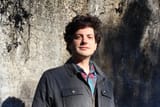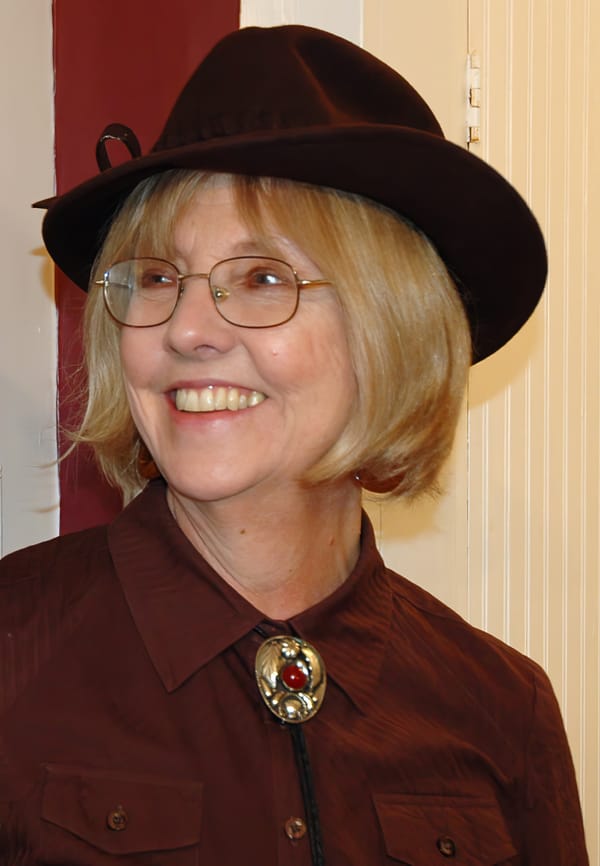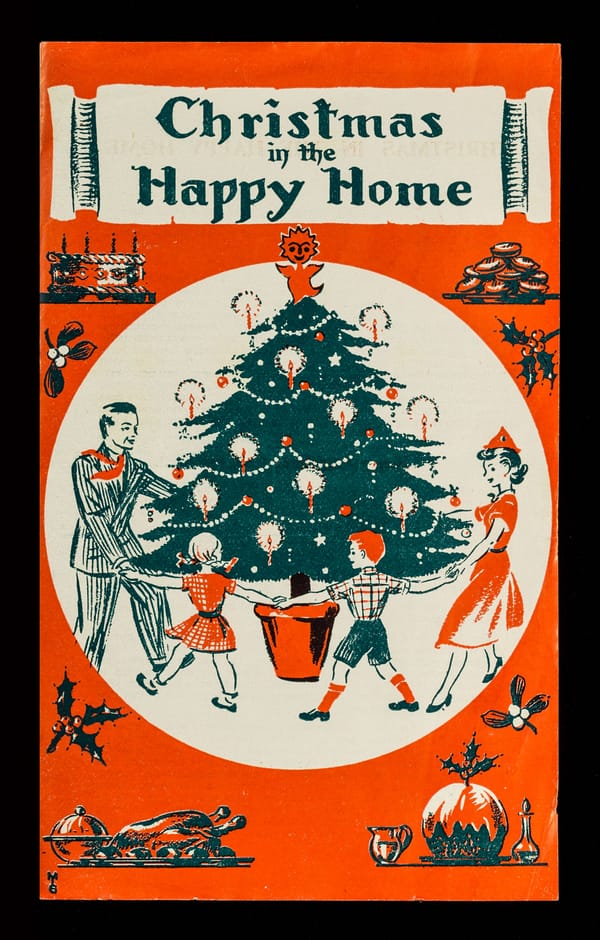A "Merchant of Novelty" — Speaking with Chiptune Artist and Vocalist Layna Bergstedt
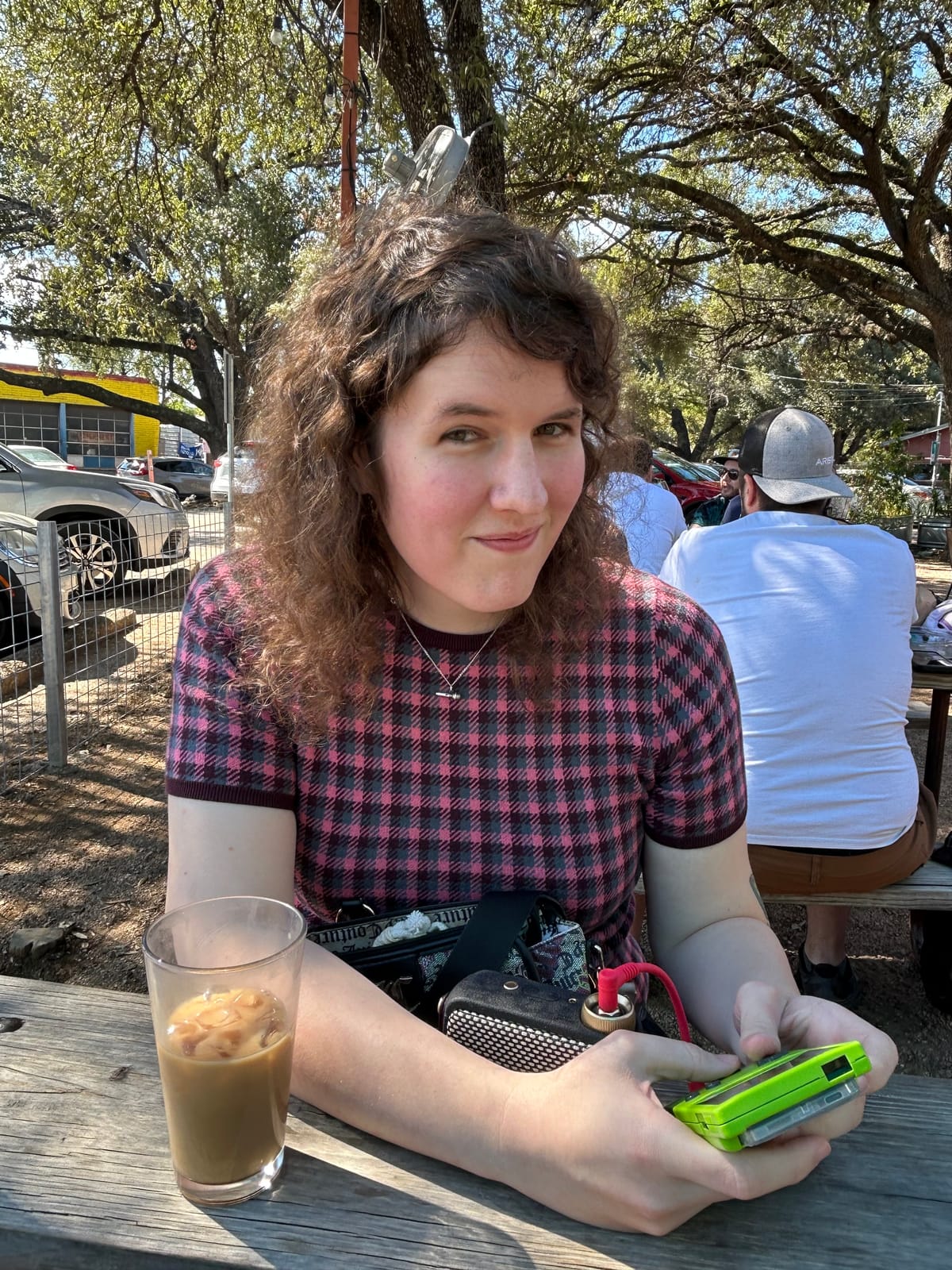
Open mics have a deserved reputation of primarily hosting guitar-plucking, folkster singer-songwriters — a classic pairing which I expect to continue even as the folkies and/or guitars become half-robot. But a few months ago a friend invited me to an open mic at Captain Quack’s, and we witnessed one act smash through the collective hum of steel strings like a block breaker.
Accompanied by just her Game Boy Color, musician Layna Bergstedt performed original songs that paired a curious complexity of sound and lyricism with the familiar, comforting tones instantly recognizable from the video game scores of yore soundtracking 8-bit heroes and heroines as they sidescrolled through adventures on land, sea, and air. Berstedt has just released O.K. demo under the name STARLONG, a sampler of what she later plans to release as a full album. After seeing her perform, I spoke with her at Radio Coffee (for her first interview, ever!) about how she ended up in Austin, her unique choice of accompaniment, and her varied experiences hitting open mics and performing in all sorts of capacities here in town.
Layna, let’s start by talking about how you ended up in Austin.
There are a few layered inputs here. The first is just family, because as we were mentioning off mic, my grandparents and beyond were from Waco, and my mother was born in Austin before my grandparents relocated to Monroe, Louisiana. By the time my mother finished school at LSU, she settled in Lake Charles, Louisiana — which is in the heel of the boot, southwest Louisiana. It’s 30 minutes from the border in Cajun country, and it shares the same area code as Lafayette. It feels like east Texas and west Louisiana have a lot of the same culture to me…Lake Charles and Beaumont are sister cities, basically.
Since we still have family in Texas, my sister ended up coming here in like 2011, and then my brother a couple of years after. When I finished college in 2019, I was like, ‘I guess I should just be here.’ On top of that, [Austin] is a solid option for music. I went to school for vocal and piano performance [at McNeese State University] in Lake Charles. It’s a small city college — I have a lot of respect for it, but most people don't know it.
I ended up studying performance [at college]. I have a lot of different streams and interests when it comes to performance style — like classical art song and opera, and there's musical theater and rock band-type stuff, especially from my high school years. I'm the type of person that just loves to be on stage doing anything. I've even done improv comedy and storytelling stuff, like The Moth-style. I love to have as much stage time as possible, and a variety of experiences…and I've done all those things in Austin. It's just such a great art scene in general.
I'd say the third reason I moved to Austin, which was probably one of the biggest reasons in 2019 specifically, is that I moved here for my transition. I am a trans woman — pronouns she/her — and I began transitioning in 2017 while I was still in college. I wanted to get to more of a queer-friendly city, and as Austin is the queer oasis of Texas, it just seemed like a good place to move. So yeah — family's here, music is here, gender care is here. That's why I'm in Austin.
What prompted you to use the Game Boy as your main instrument?
Since early childhood I’ve loved video game music, and very specifically the 8-bit era of music. When I was in preschool, I had a cousin who went off to college and gave us his old Nintendo Entertainment System, and one of my earliest musical memories is loading up Mega Man 3. That was one of the coolest video game soundtracks of all time…you need to look up the opening theme to Mega Man 3 if you’re unfamiliar, it's just iconic.
When I was three years old, it blew my mind, and I would play Mega Man 3 all the time. I'd always wait five minutes at the title screen, just to listen to it loop a couple of times. I would have my Game Boy and my Worm Light playing late at night, and when I was ready to finally go to bed, I would turn the light out and let the Game Boy die, just listening to whatever random game loop it was on. That was my first touch point in music, honestly. But it was funny — I feel like that interest led my parents to put me in piano and classical music studies to balance that out, as if to be like, ‘Hey, video game music is cool, but why don't you learn how to do it properly first?’
What brought you to chiptune music more generally? Creating this type of music means you have to work with a lot of limitations — is that something that appeals to you in general?
Oh, I thrive under limitations. For example, there isn't any dedicated percussion on Game Boys, specifically. You have a noise channel that you just sculpt with the attack envelopes that you see on all sorts of synthesizers to emulate percussive sounds. I feel like the limitations of it are really inspiring, creatively.
This is literally my childhood Game Boy — it has an old Pokemon sticker and there's a hole in it from an improper modding experience. I was kind of broke, and I'm not the best at accompanying myself, partially because of joint pain-type things — like I don't really play piano much these days except when I'm composing. I already had a Game Boy, and I figured out how to make a drum machine, essentially. That’s what I’ve been performing with.
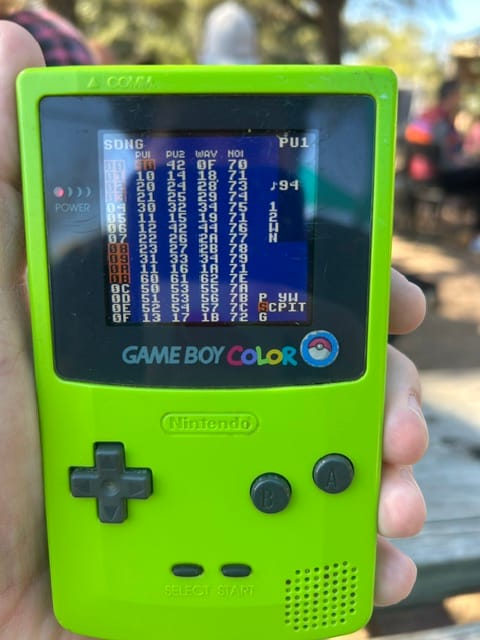
Do you compose with the Game Boy as well?
The app on the Game Boy I'm using is called Little Sound DJ [LS DJ], and it’s a typical music tracker software. But if I wanted to, I could write the song entirely on Game Boy. The reason I don't, obviously, is gonna be the eye strain, 'cause it's a tiny screen. Even with a backlit screen, it's really tiring to write directly on Game Boy. Some people want to truly write on the hardware. They'll do things like put the Super Game Boy on a Super Nintendo Entertainment System, like a thing that mounts on the cartridge. There's also something similar for the Game Cube. Another thing you can do, which is what I do, is I have an emulator set up on my desktop computer, so I can scale to however large I want.
I write in the program on my computer, and then flash it later. The other major limitation of this, compared to writing in Ableton, is that there isn't a Ctrl-Z. The copy-paste functionality is there, but like a lot more tricky…it's a lot easier to make mistakes that you can't just immediately reset. When I'm still experimenting and want to have a keyboard, I'll probably prearrange in Ableton to get ideas written down. Once I have a good conception of what the arrangement is, then I open up LS DJ and just write everything out.
Your new release is called O.K. demo. Does “demo” imply you’re going to try other types of production later? I find the way it sounds now very compelling.
It is a demo in the sense that I am using those five songs on the album I'm writing. I feel like the other reason I call it O.K. demo is because I'm not entirely happy with the production quality [editor's note: following up via email, Layna added: “Last May, I spent most of the month researching the fundamentals of audio recording. I set up a basic closet studio, I downloaded some plugins, and recorded and mixed the demo myself over the course of a few days. The one exception being Weston (McCoy’s) saxophone solo on "SUMMER 14", which I mixed from the stems he recorded. I'm proud in the sense that I'm glad the demo came together at all, but I certainly want to have a veteran sound engineer help for the album].
I'm grateful for what I accomplished, but hopefully the album itself will be a little bit more polished, both in versions of the song, but also just in general quality. It’s also kind of a pun, because ‘demo’ is ‘but’ in Japanese. So it’s like, “okay, but…” I want it to feel like a taste, an invitation to be like, ‘what else is there?’ The songs will have a different flow within the album itself, and hopefully once I release the album, they will have a different meaning in how they're recontextualized.
To move away from the way the music sounds, I’m also curious about the lyrics. What kinds of themes or emotions were you working through to create what you’re singing here?
I first want to say that I've been wanting to write an album for 10 years, and I've been failing to write an album for 10 years. I get distracted. I feel like that's a big theme of the album in general, just recycling past experiences and recontextualizing them to make them more concrete. I definitely have always wanted to do more of a concept album, but the idea is that I am finally setting aside time to make the album for me, so selfishly a lot of the album’s writing is about my creative process.
I'm trying to write in a way that is hopefully relatable. It’s like, ‘Hey, this is what has happened when I've tried to write in the past. These are the pitfalls I'm having in terms of imposter syndrome, anxiety about sharing, anxiety about having writer's block’…just flowing from the writing of a song to the sharing and connecting with people over music, and over the course of the album.
At the end of the album, I want to have a work that not only is a major accomplishment for me to finally have done, but one I can also lean on as a personal compass in the future when I'm having trouble with my artistic journey. I can just be like, ‘Layna, not only have you dealt with this before, you wrote a song about it, and so now you can just use that as a jumping block.’
Could you tell me about your experience singing in groups, and who you sing with now?
I did choir all through college, and I was the president of my choir for three of those years. When I got here, where I really found my home is with Panoramic Voices, which is a non-audition ensemble. I could just torpedo the rest of your time today and just gush about how much I love Panoramic Voices. I try and get as many people as possible to join.
They do such a service in terms of creating an open space for people of all financial backgrounds, all sexualities, all ethnicities. We do a lot of performances at the public library, and we have a holiday concert coming up that's going to be at Central Machine Works, which is a place we've collaborated with several times. Panoramic Voices are an amazing organization and honestly, everyone should follow them 'cause they're great.
I first saw you playing at an open mic at Quack’s, and I understand you also did a talent show here at Radio. What has your experience been like doing open mics, and what has the reception been like?
I love the open mic scene so much. In general, if you go to a couple of open mics, you'll meet people who are regulars all around town, and you just keep a note doc of random Instagram accounts. I think the very first open mic I went to was at Kick Butt Coffee, which is on the north side, and that's where I started meeting a lot of people who go to other open mics, like Paige Berry’s open mic that was at Captain Quack’s and now is at Ani’s Day and Night.
I am a regular at the Scene Productions open mic, which used to be at Nomad and now is at Tex Pop. [Open mics] are great for meeting collaborators. It's great for working through stage fright [...] it's also just been so welcoming in general.
And one of the things I often say at an open mic is that if anyone wants to learn, I would be happy to share my knowledge. It's a very DIY scene, chiptune, and a lot of the knowledge bases you’ll find are on an old forum post or just some Reddit post, and then like a couple years later it's been deleted. It's like, whatever you learn from it, that's all you know! That's why I’m really retentive with notes, because I've had plenty of amazing tutorials just disappear on me. Even if I'm not an expert, I do have a lot of experience researching this stuff, and I'd be happy to try and help people out.
There are some towns in this country that still have decent chiptune scenes. I mentioned Seattle before [off mic], and I know Boston and some New England areas have some decent chiptune representation. There's Super Magfest coming up in January, and they have a stage called Chipspace, which is for chiptune artists across the country. I'm going to be there this coming January, and I'm hoping to meet a lot of people then.
In Austin, I can't say I know too many people who are regularly trying to perform chiptune music, on Game Boy or otherwise, [editor’s note: Layna mentioned San Antonio’s Star Fighter Dreams previously in our conversation as one exception], and I feel like I'm going to keep on asking people at open mics until someone takes me up on it. And I'm gonna be like, ‘Okay, set a day. I'm gonna bring you over, and I'm just going to put you through the ringer.’ It's very tedious, but it's so amusing and so rewarding. I feel like I am a merchant of novelty. I want to charm people with performances that are outside of the script of what a rock show, what a theater piece, what electronic music is.
I feel like that's a big reason why I continually go back to the Game Boy — because of the nostalgia factor and just the surprise factor alone. It just puts a smile on people’s faces. It inspires me to go more and more novel…it fuels curiosity, and that curiosity just feeds back into music, you know?
